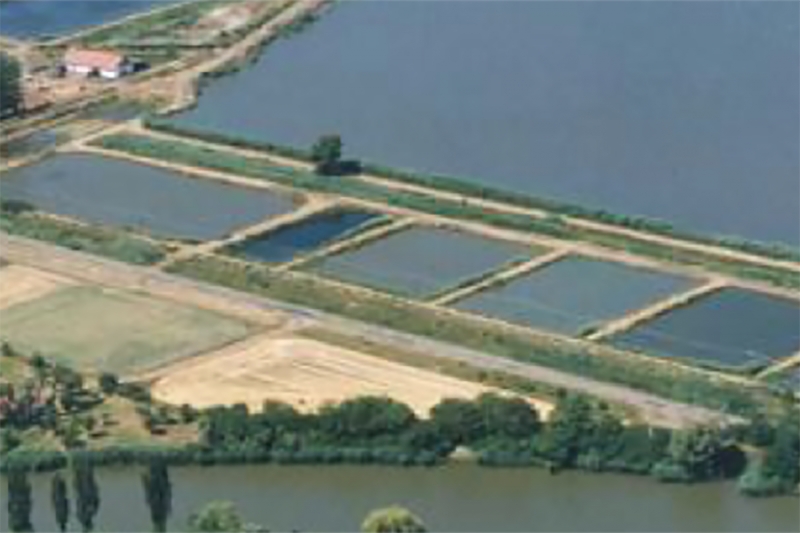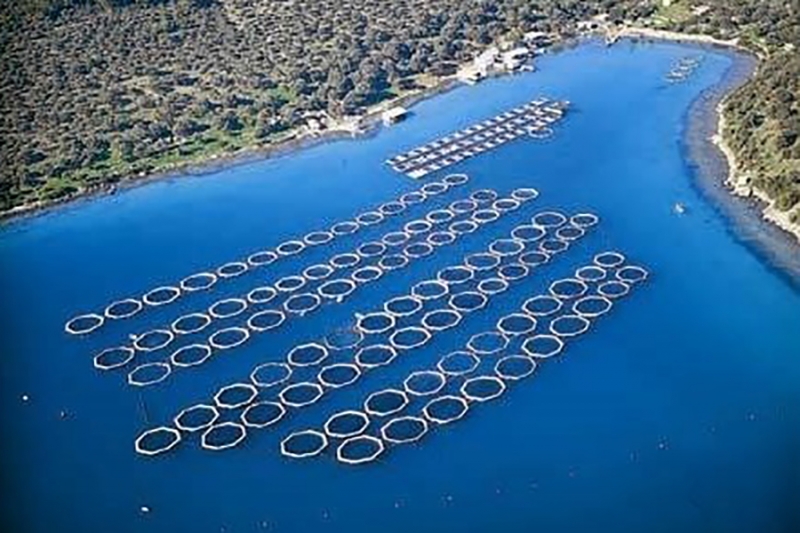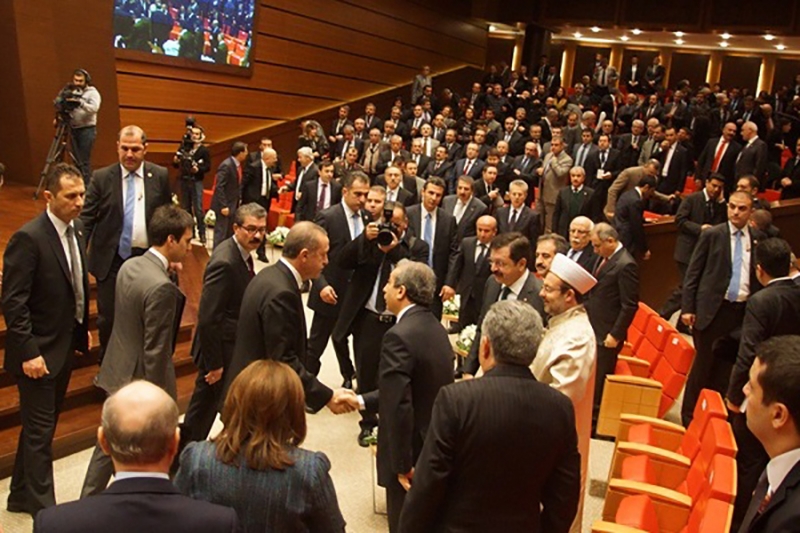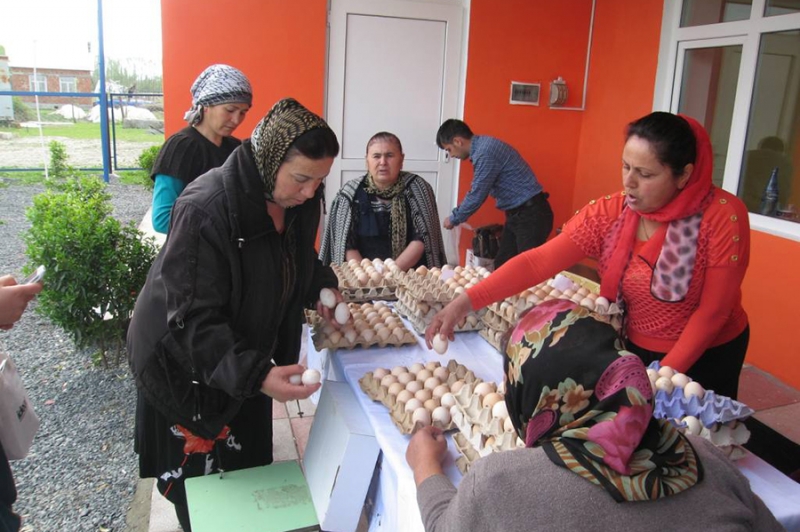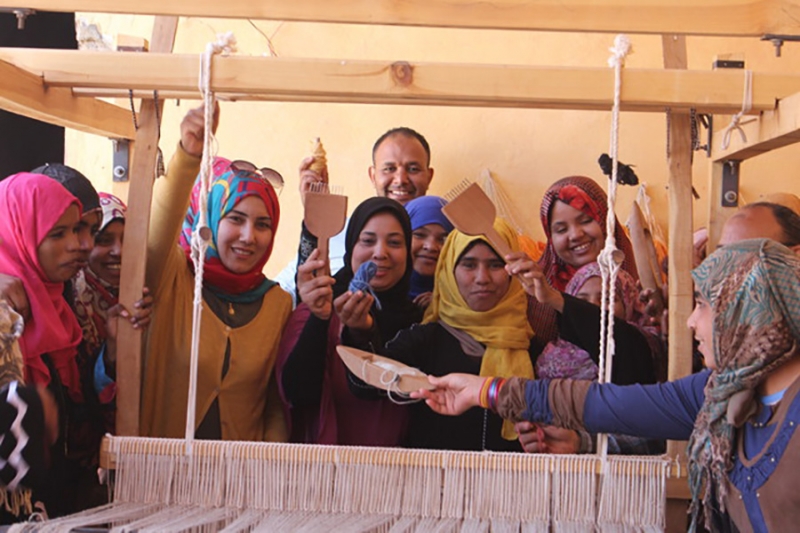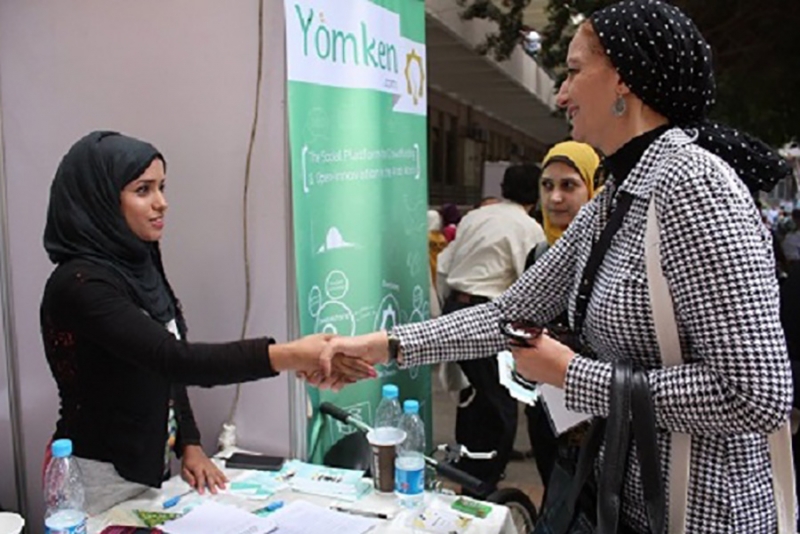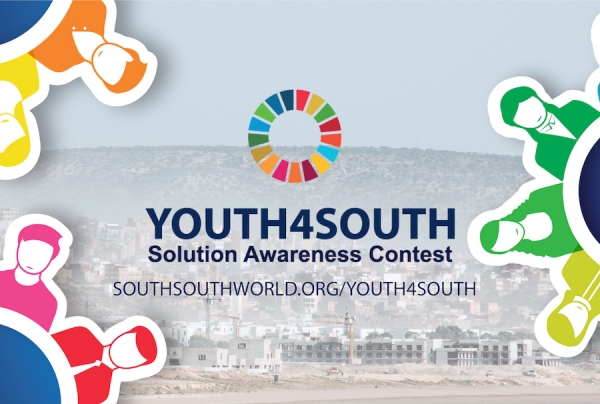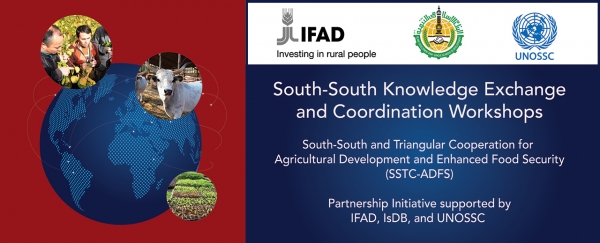 SSDA Solutions
South-South Development Academy
SSDA Solutions
South-South Development Academy
Blog
As the National Electoral Commission (NEC) moves towards the conduct of Special Elections for Senators in 2014 to be followed probably by referendum in 2015, the administration of NEC deemed it expedient to take a number of steps aimed at enhancing short, medium and long-term viability of the commission. As such, NEC has started capacity building and professional development programs by means of in-house trainings, external study tours and other professional training activities. It is from this backdrop that NEC, in collaboration with UNDP-Liberia organized a study tour to understand the electoral process of Rwanda in September 2013.
The overall objective of said trip was to continuously ensure the personnel and institutional capacities of NEC and House of Representatives/Senate are built. In a nutshell, the trip sought to achieve the following:
- Sharing of experience;
- Learning from sister institution, NEC Rwanda, on elections administration and management;
- Acquiring more knowledge in legislative development; and
- Improvement in the oversight functions of NEC by the Legislature.
The project funded by UNDP was implemented in September 2013.
The two-week study tour was guided by a curriculum that had been developed by UNDP Liberia and the Rwandan election administration to meet the specific needs of the delegation. It included professional presentations that ranged from the administrative structure of NEC Rwanda to the operational bureaucracies. The numerous professional presentations, meetings and visits to NEC Rwanda printing and local offices, provincial governors, national ID authority, gender monitoring office (GMO), National Women Council and election observation revealed to the team that the operational structure of NEC Rwanda is much more developed than that of NEC Liberia. The high level of professionalism and commitment of the core staff in NEC Rwanda makes the electoral process understandable to all stakeholders, including political parties.
Finally, the administrative structure of NEC Rwanda and election operations conducted by it is geared towards sustainability; that is, the Commission has small but highly trained, well-placed professional staff. Because of this, NEC Rwanda uses limited amount of materials during elections to achieve very excellent outcomes. This also is good for the long-term viability of Liberia’s election management body.
Outcome was the basis of an institutional reform, including adoption of modern business processes and procedures by NEC.
Contact details:
National Electoral Commission
P.O. Box, 6449 Kigali – Rwanda
Phone: +250 252597800
Email: This email address is being protected from spambots. You need JavaScript enabled to view it.
The demand for protection of natural resources has stimulated the development of environmental friendly aquaculture technologies. Freshwater pond fish farming is a unique segment of European aquaculture. Pond fish farms besides producing fish provide ecosystem services, contribute to achieve the goals of NATURA 2000, a network of nature protection areas in the territory of the European Union. Extensive fish ponds are usually surrounded by reed belts and natural vegetation, thus providing important habitats for flora and fauna. Many pond fish farms have been turned into multifunctional fish farms, where various other services are provided for recreation, maintenance of biodiversity and improved water management.
The technology on combined intensive-extensive pond systems for water-efficient fish production offers a solution for the treatment of nutrient-rich effluents of intensive pond aquaculture systems. The objective is to reduce pollution from intensive systems and utilize the waste organic content of the effluent water for additional fish meat production, thus increasing the production efficiency and reusing the water. First pilot system established in Hungary in 1998.
The principle of the method is to treat the effluent water enriched with organic and inorganic nutrient of intensive fishponds (high stocking density, intensive feeding) in an extensive pond (medium stocking density supplementary feeding). In the extensive pond, a part of the nutrients is utilised through various biological production processes and the other part is fixed in the pond sediment, and the water treated or purified is recycled to the intensive fishponds. Filtering and bottom-feeding herbivorous and omnivorous fish are reared in polyculture in the extensive pond. The nutrient retention capacity of the system allows for an efficient treatment of the water, after which it is returned to the intensive ponds, ensuring water-efficient fish production.
This solution reuses the waste nutrients, which would otherwise be lost, results in a 20-25% improvement in nutrient utilization. The combined fish production resulted in higher protein utilisation by 26%. The system proved itself efficient in reducing water pollution while obtaining additional fish yield in a water-efficient way.
By using the solution, both the water demand of fish production and the nutrients loading in the environment are decreased.
The system can be adapted to existing or newly built pond systems. Its efficiency is limited by the nutrient retention capacity of the extensive pond but, in case of using carp-based polyculture, 1 ha of pond area can efficiently treat the water from the intensive production of about 10 t fish in Hungarian conditions. Higher treatment efficiency may be expected in warmer climates.
The solution was thoroughly researched in order to better understand the nutrient flows in the system, thus allowing to fine-tune the system and enhance its efficiency. This scientific knowledge and know-how can be of use to other countries.
Budget: The investment and operating costs are about 2.5 and 1.25-2.25 EUR/kg fish yield, respectively. However, it depends on the local material and labour costs, as the system is based on ordinary fish ponds, the investment costs are basically the same as those of pond construction, i.e. they depend on the availability of water, the costs of labour etc. If the system is developed on the basis of an already existing pond system, it significantly reduces the investment need. The operating costs are also similar to the typical local operating costs of pond systems, although the system uses less water, feed and manure than comparable conventional systems while providing extra fish production.
National Agricultural Research and Innovation Center, Research Institute for Fisheries and Aquaculture (NARIC HAKI)
Contact person: Dr. Dénes Gál, Research Institute for Fisheries and Aquaculture (NARIC HAKI)
Phone: +36-66-515-300
E-mail: This email address is being protected from spambots. You need JavaScript enabled to view it.
In Turkey, rainbow trout, sea bass and sea bream production grew rapidly from 1990 to 2000, but the following two years were accompanied with a slowdown in growth rate of the sector as a result of economic crisis in 2001. In 2003, the aquaculture production of 1314 farms was 78 thousand tons only.
To stimulate the economic development of the sector, in particular, increasing fish production, the Government of Turkey decided to build capacity of aquaculture sector and provide financial support to fish farmers.
The implementation of the support plan was carried out by the Ministry of Agriculture and Rural Affairs of Turkey. In this process, it has been reiterated that environmental measures should be strictly monitored according to the EU standards, and that no support should be given for antibiotics and other chemicals that adversely affect the ecosystem. The payment was released depending on the sales bill during the early period of the subsidisation but later on the amount of consumed fish feed.
During the early subsidisation period (2003-2013) fingerlings of fish species were supported with 0.05 TL/ind. Subsidisation amount for rainbow trout increased from 0.30 at the beginning to 0.65 TL/kg. Sea bream and sea bass support amounts were 0.50-0.85 TL/kg that was ended in 2015. Meanwhile, 1TL support for each kg of new species is given to diversifying Turkish aquaculture. Owing to the financial support, all farm productions and real capacity were able to be properly monitored and recorded.
This action gave its fruit and increased the production at a significant level. The growth rate of aquaculture production of Turkey was 300.6% during the subsidisation period. Total annual production increased from 79,943 to 240,334 ton. As a result of the subsidisations an extra employment has been created for the rural areas and people could increase their income at a meaningful rate. Also, aquaculture diversification has been performed in both marine and freshwater environments.
Several factors played significant roles in this successful program, including the determination of the government, entrepreneurs’ investments and taking risks and consciousness-raising by fisheries associations.
Solutions can be easily replicated but it is suggested that the subsidization must be conducted fort a short term in order to allow the overgrowth in the sector compared the actual requirement.


Budget: In total the farmers` received support has been achieved 1.14 billion TL.
Partners: General directorate of Fisheries and Aquaculture, Ministry of Food, Agriculture and Livestock of Turkey, Aquaculture Farmers Association
Contact information:
General Directorate of Fisheries and Aquaculture, Ministry of Agriculture, Food and Livestock of Turkey
Address: Eskişehir Yolu 9. Km Lodumlu / ANKARA
E-mail : This email address is being protected from spambots. You need JavaScript enabled to view it.
Turkey is included in the Guinness Book of World Records for the highest annual per capita consumption of bread with 199 kilos per person. with nearly 1.8 billion loaves going to waste every year. Before 2013 Turkey wasted 5.9 percent of all bread production, amounting to 6 million loaves of bread every day with total nearly 1.8 billion loaves every year.
With the aim of preventing bread waste and the loss it creates in economy and in order to create awareness and sensibility to generalize the use of whole wheat bread the "Campaign for Preventing Bread Waste" was launched by the Turkish Grain Board (TMO) and started on January 17th, 2013.
With the broad support of the government and civil society, the Turkish Grain Board (TMO) organized a campaign that blanketed 12 major cities. It targeted households and bakeries as well as cafeterias, restaurants and hotels.
The campaign`s goals included educating children on how to prevent bread from being wasted and informing the public on how to properly consume bread. This included tips on preserving loaves from going stale, discouraging the purchase of more loaves than needed, and overproduction by bakeries. It was explained that using bread in animal feeding was wasting it too. The campaign also focused on restaurants and other places where bread consumption is high, as well as its waste. It also encouraged the consumption of whole grain bread instead of traditional white bread as more resistant to mold.
The campaign also coordinated efforts for the recycling of stale bread, such as by promoting dishes made with stale bread. The Ankara Metropolitan Municipality spearheaded efforts with a municipal subsidiary that produces bread by launching the production of chips made entirely of processed bread as a healthy alternative to fried potato chips.
In addition to the hallmarks of traditional information campaigns such as conferences and exhibitions, orchestrated marches and aired public service announcements on television, radio, billboards and online the campaign for preventing bread waste also used creative strategies to connect with ordinary people on this important issue. To complement discussions about food and bread waste in the school curriculum and in mosques, the Grain Board organized art and poetry competitions engaging as many as 25 million children. It printed the campaign logo on national lottery tickets and even published a recipe book that celebrates stale bread as one of the most useful ingredients in the pantry.

According to a research conducted by TMO in the end of 2013 there was a positive change in society’s bread consumption habits since the campaign was launched., The daily bread consumption has decreased to 86 million loaves against 95 million before the campaign and the annual bread consumption decreased to 31 billion loaves in 2013 against 35 billion in 2012. Annual bread consumption per capita decreased to 104 kg against 116 kg in 2012, which is equivalent of total bread consumption 26 billion TL in 2012 and 23,5 billion TL -– in 2013. There has been a 10% decrease in every aspect. The campaign also helped to spread awareness among the society about bread waste and different diet methods. The daily bread waste has been decreased from 5 million 950 thousand loaves in 2012 to 4 million 900 thousand loaves (18%) in 2013. Therefore, only one year 384 million bread saved from being wasted (1 million 50 thousand loaves saved per day). Bread waste has been reduced 40% in households, cafeterias in schools and workplaces, and 1% in businesses such as hotels, restaurants and bakeries and around 18% in general.
The Turkish Grain Board expects levels of bread waste to drop even further over time as new behavioral habit become the cultural norm. Of all the target groups, households reacted especially well to the campaign, reducing bread waste by an average of 40 percent.
Among many possible solutions; extended shelf life of bread by natural ingredients and food safety measures, increase in bake-off production, shift from artisanal to packaged bread and raising awareness and information to the consumers will be most importance in prevention of bread waste.
Reducing unnecessary waste and excess purchases saved consumers an estimated campaign saved 2,8 billion Turkish liras (US$ 1.2 billion) for the Turkish economy in 2013.
With one-third of global food production currently wasted or lost, the international community is homing in on Turkey’s success. The Grain Board has conducted international activities and shared its campaign model as a best practice. Turkey`s campaign was also referred as a model practice in waste reduction activities in March 2014 issue of monthly bulletin published and sent to member institutions all over the world by FAO – Save Food – Global Initiation of Food Loss and Waste Reduction.
Budget: Approximately 590 thousand TL (around 165,000 USD)
Partners: The Ministry of Food, Agriculture and Livestock, the central and provincial organizations of the Turkish Grain Board (TMO); governorates, municipalities, other establishments and foundations, non-governmental organizations, private sector and media.
Contact information:
Turkey, General Directorate of Turkish Grain Board Ankara
Turkish Grain Board İzmir Branch Yeniliman Alsancak
Contact person: Expert Gökhan ŞEKER, Turkish Grain Board İzmir Branch
Telephone: 0542 677 94 69
E-mail: This email address is being protected from spambots. You need JavaScript enabled to view it., This email address is being protected from spambots. You need JavaScript enabled to view it.
http://ssda.southsouth.world/ssda-blog/author/42-webadmin?start=336#sigProId534e625f59
AzRIP is a project established by the Government of Azerbaijan and implemented by the State Service on Management of Agricultural Projects and Credits under the Ministry of Agriculture of Azerbaijan Republic to invest in the rural development of six regions (Mughan-Salyan, Lower Shirvan, Nakhchivan, Karabagh, North and North West) of Azerbaijan, particularly targeting community-based infrastructure investments. The objective is for rural communities to identify their needs and then openly prioritize, plan, build, monitor and manage infrastructure projects for their social benefit and increase use of infrastructure services.
AzRIP provides financial and technical assistance to communities who are willing to invest some of their own time, labor and funds to improve the social wellbeing of their communities. Projects may include such things as the rehabilitation or new construction of schools, health posts, hospitals, potable water facilities, irrigation systems, electrical and natural gas systems, roads, bridges, community centers, etc.
Finances are provided through a loan from the World Bank to the Azerbaijan government. AzRIP targets rural communities with more than 1,000 and less than 10,000 people in areas that meet the criteria for high poverty incidence. These communities cover all regions of Azerbaijan.
The project has three components:
- Infrastructure: includes the identification, design, construction, rehabilitation, operation and maintenance of rural infrastructure, based on the priority needs identified by communities. The average size of Community Projects is USD$90.000. Community Projects over US$ 120.000 will require prior review by the Working Group.
- Capacity Enhancement. Communities, NGOs/CBOs and support service providers have their capacities enhanced through trainings, conferences, lessons learned seminars, consultations.
Project Management. This component finances the administrative and operational project implementation and management costs including the hiring of qualified personnel to undertake procurement, disbursement, financial management, as well as reporting, monitoring and evaluation.
Some of the key highlights of the project are:
- Communities are selected on the basis of infrastructure needs, community assessments and their ability to organize themselves and implement and maintain projects.
- AzRIP contributes up to 90% of the funds for projects. Communities must contribute at least 10%. At least 2% this must be in cash. The remaining 8% can be in their own labor or materials.
- Communities selected to participate in a Community Mobilization process facilitated by Project Assistance Team (PAT). PAT assist the communities in an open and transparent process of identifying their needs, prioritizing and selecting projects as well as electing a Community Project Committee.
- PAT train the Community Project Committees along with members of the Municipalities and community leaders in leadership, management, planning, accounting, procurement, project implementation, monitoring and proposal writing.
- Once the Community Mobilization and trainings are completed, communities, with the help of engineers they choose and with the assistance of the engineers of the Service Providers, design and plan their own projects and send project proposals to AzRIP for approval.
- Approval of projects is based on proper design, appropriateness of project, transparency of community approval and AzRIP’s site appraisal.
- For projects under $15,000, communities may procure materials and do their own construction. For projects over $15,000, a contractor must be hired through an open competitive bidding process.
The community establishes a Maintenance Committee with community funds to maintain the project throughout its life. Community has to make sure that, there is an arrangement either municipality or CBOs to be a base for maintenance and sustainability as well as operation of CPs
Solution’s impacts:
There are many successful stories within the framework of the project implementation. Most of them are based on communities’ mobilization and increased self-reliance of the inhabitants.
- An example of the transformative impact of AzRIP’s community investments is demonstrated by the current community action in Gaysa community, located in a remote area 25km from Balakan rayon centre. Communities that have successfully partnered with AzRIP for rural infrastructure community projects now have access to opportunities to apply for support to community-based livelihood projects. In Gaysa, there was not a single processing workshop or incubator in the locality. The community has embarked on a livelihoods incubator project and evidence suggests this was a relevant and strategic choice of investment. Every household has sufficient eggs for entry into the incubator, as well as corn seed for use as chicken feed. With the incubator operational, the majority of community members have the opportunity to deal directly with the production of chicken meat and eggs, using the breeder eggs and the corn seeds that they have in hand. Each household can provide 80-100 eggs for incubation and after 3 weeks they can recall 60 – 80 chickens. The income accruing to community residents enlarges due to the savings in reduced transportation costs to the market. The community has successfully transformed into a production and service delivery entity and community members have become entrepreneurs. Importantly, the incubator workshop is being managed by women entrepreneurs as a venture. The project in Gaysa resulted with the creation Limited Liability Company (LLC) with legal status that deals with private production and service delivery. It is fully functioning based on local human and natural resources. The most important thing for AzRIP is that members of the community earned such skills as participation in decision-making, making right project selection and management skills.
- AzRIP conducted a mobilization workshop under a pilot program on livelihood projects in 2013 and the Kamalli Business Group consisting of five members was elected. The geographical position of Kamalli, the favorable conditions for poultry development and other factors were considered closely, and the implementation of its Chicken Incubator Development project was approved. Today, 3,195 people from neighboring Naharli, Hajigasimli and Mazrali communities are also benefiting from this project. Consequently, its implementation addresses the needs for chicken in both the Saatli rayon and the overall Aran economic region. Buying eggs from the Kamalli community will continue to improve the welfare of the population and create new jobs. The people of Saatli will remember the success of this project and what it has provided them for many years to come.
The poor condition of roads has negatively affected the socioeconomic development of the Galabadin village and integration with neighboring communities. It has also caused serious difficulties in transporting community agricultural products. In a very short time, the community of Galabadin was mobilized around the problem. They succeeded in the rehabilitation of a 5,900 meter gravel road with AzRIP support.
Solution budget:
Up to 90 000-120 000 USD from the State Service on Management of Agricultural Projects and Credits under the Ministry of Agriculture of Azerbaijan Republic Azerbaijan (funded with support from the World Bank) 10% of total cost is to be provided by community member (2% in cash and 8% in-kind)
Partner:
State Service on Management of Agricultural Projects and Credits under the Ministry of Agriculture of Azerbaijan Republic
Azerbaijan Rural Investment Project
Contact information:
Subhan Asgerov, Director, Second Azerbaijan Rural Development Project AzRIP
Gulbaniz Ganbarova, Deputy Director and Community Development Manager
+99412 493 48 13, 493 66 07
e-mail: This email address is being protected from spambots. You need JavaScript enabled to view it. This email address is being protected from spambots. You need JavaScript enabled to view it.
Egypt ICT Trust Fund (ICT-TF) in cooperation with the Japanese Government initiated the “Youth Employment Generation Program in Egypt” started in April 1, 2012 to June 30, 2013. The program addressed the mismatch between the skills demanded by the private sector and youth skills to provide youth with the necessary vocational, IT and soft skills to increase their employment prospects.
The solution consists of the following two main components:
- The MSMEs (Micro, Small and Medium Enterprises) component aims to increase the effectiveness and improve the profitability of 1500 MSMEs owners and entrepreneurs through the integration of ICT in their business operation, through two main techniques:
- Direct MSMEs: here the program conducts awareness sessions, train of trainers and builds the capacities of MSMEs;
- Indirect MSMEs: here the program builds the capacities of MSMEs through SMEs self-learning toolkits.
This component is based on holding a competition on the best social entrepreneurship ideas to successfully implement their projects... And, it includes networking and mentorship services, providing TOTs to ICT-TF trainers to provide this training later.
- The vocational Training and the Internship component helps young people by setting up a mechanism to connect private sector companies with young men and women to increase their chances to access internship opportunities and join the job market. The program starts with a labor market survey in each governorate to determine the targeted jobs and train both partners; a study of “Marketing Demand Analysis” was conducted at the national level.
The project implementation cycle went through the following phases:
- Needs assessment- 1st quarter: Identify the needs of the rural communities and the important role of the local active NGOs, grassroots leaders in lives of common people synthesizing and aggregating positive and negative learning
- Initiation and Building PPP Partnership – 2nd quarter: Update action and communication plans, acquire needed resources and establish a Public Private Partnership and organize of all partners to design solutions considering challenges and potentials that facing turn the results into a real project with applicable implementation plan.
- Implementation- 2nd – 4th quarter: Develop the implementation plan.
- M & E –1st - 5th quarter: Keep monitoring and evaluation of the progress, and documentation of the project.
- Sustainability and dissemination- last quarter: Disseminate the program findings and recommendations among stakeholders and sustaining the project by scaling it up.
At the outcome level, 60% of MSMEs trainees, who were trained face-to-face, applied the acquired ICT skills while 38 % of MSMEs trained virtually through Kayanak developed their own web-page to market their projects. On the other hand, 80% of trained entrepreneurs applied the acquired ICT and social entrepreneurship skills or used the networking and mentorship services, while 90% of vocational trainees have got employment opportunities that require ICT skills. The outcome of the program is reflected in the trainees’ application of the acquired skills; developing websites, applying e-marketing and developing electronic accounting system.
Partners: Egypt ICT-Trust Fund (Egyptian Ministry of Communication and Information Technology, and UNDP Egypt), Japan Government, Egyptian Ministry of Youth, Egyptian Ministry of Investment (Bedaya), Social Fund for Development (SFD), Education for Employment (EFE), Local NGOs.
Contact details:
Mailing Address: South-South Development Academy: 6th Ibn Maysser st., off Mahmoud Azmy st., Zamalek
Tel: (02) 2737 5086/7/8/9
E-mail: This email address is being protected from spambots. You need JavaScript enabled to view it. – This email address is being protected from spambots. You need JavaScript enabled to view it.
Website: http://www.ssdaegypt.org
There are a big number of innovators in the Arab World with creative ideas for new products but there is no mechanism of financial support and suitable marketing for their products. One of the main difficulties facing innovation in the Arab world is the absences of a platform through which innovators can identify the needs of community environmental and industrial challenges even work to resolve it and get at the same time the funding and support needed by the market.
In 2012, Istebdaa’Inc (not Profit Company) launched Yomken. Yomken is an open innovation and crowdfunding platform for the Arab World that tries to bridge the gap between the challenges faced by micro and small entrepreneurs (the informal MSEs) working mainly in low-tech and informal manufacturing industries (designing new products and upgrading current products and production process) and the innovative ideas and skills of potential problem solvers (graduation projects, innovative solutions from recently graduated engineers, designers, researchers who are looking for a job, the Arab diaspora).
Yomken offers two main Services, which are:
- Platform for innovation participatory, local companies and government agencies and non-government organizations and small enterprises and micro serve low-tech micro as well as NGOs, where they can put the challenges they face. These challenges range from the development products, modifying the production lines and the use of alternative raw materials.
- A market, where innovators and creators can publish their projects and innovative patents of their own, as well as market studies because they are tied up with financial institutions for support and/or the required investments, as well as other collaborators and the people of expertise to assist in the development of their projects.
Yomken other services are:
Innovation and Management Innovation:
- Consulting on innovation and management innovation.
- Follow- up and evaluation of projects.
- Economic analysis at the micro, medium and macro level.
- Technology foresight for business planning.
- Action “generates ideas” of the various blocks to identify the links and possible gaps workshops.
- Data analysis using social network analysis tools, econometrics, and other advanced tools.
Open Innovation Services:
- Design, management of innovation competitions in product design ideas and machining.
- Care calls for other organization to seek as a problem has been studied well and you need a certain party or organization to solve them.
- Create a call to ask for challenges revolve around the subject and that the civil societies and non-governmental organizations working in a particular industry or a specific place or with a certain age group, where Yomken is providing a solution challenges by various sponsors.
The key achievement of Yomken as far as now:
- 78 Projects and inventions have been funded to solve specific challenges in the society. For example, The Egyptian cotton machine and the foldable bike.
- Five different training modules have been established by Yomken for students, innovators, potential entrepreneurs, NGOs, and Civil servants.
Partners:
- In 2014, Yomken established with governmental bodies such as the Academy of Scientific Research and Technology and the Women Business Development Center.
- In 2015, established a partnership with Assuit University, and signed an MOU with PWC.
- Nahdet El Mahrousa.
- Misr El Khier/ GESR.
- Sadko, Redec, INJAZ Egypt, Catalysis, ARC, Al Maqarr, V-vvorx, Egycom, Schaduf, NEP, GIZ, Violet, Acacias For All and Federation of Economic Development.
Contact details:
Mailing Address: South-South Development Academy: 6th Ibn Maysser st., off Mahmoud Azmy st., Zamalek
Tel: (02) 2737 5086/7/8/9
Fax: (02) 27375084
Website: http://www.ssdaegypt.org/
E-mail: This email address is being protected from spambots. You need JavaScript enabled to view it. – This email address is being protected from spambots. You need JavaScript enabled to view it.
YouTube: https://www.youtube.com/channel/UCw1l5nPlOlBE5B3zR5XzwWQ/featured
In Egypt, there are many hearing impaired persons that suffer from illiteracy, low income and poor chances in education and employment. In addition, they live in isolation from the rest of the society because of the lack of communication with normal people due to their disability.
Tawasol was launched in 2015 by “Khalifa Computer Group” (KCG), an Egyptian family-owned IT company upon identifying the challenges facing those with hearing impairment in Egypt. The founder, Dr. Adel Khalifa decided to adopt a strategy to build an infrastructure that can aid those with hearing disability in their paths in education, employment, and breaking the barrier of communication with society. The Khalifa Computer Group in collaboration with the Ministry of Communications and Information Technology and the Ministry of Education developed the package of software which aims to improve the quality of life for people with disabilities by using ICTs to facilitate access to information and knowledge, boost interaction with the community and increase opportunities for employment. Thus, Tawasol was designed as computer software for disabled students, their teachers, and family members to enhance communication between each other and the society.
The KCG team faced numbers of challenges that prevent adopting standard tools from the developed countries in Egypt such as:
- The native language in Egypt is Arabic;
- The Egyptian Sign Language for Deaf is not unified and is definitely different from the American or European sign language;
- A large number of the Deaf in Egypt are illiterate and;
- In spite of the governmental law that 5% of the employment in all companies and governmental offices should be from people with special needs, the law is not applied.
Thus, KCG team developed a new strategy for building an infrastructure of assistive technology tools suitable for the Egyptian environment and the Deaf people there. The research leads to achieving four components for these tools (See Diagram 1):
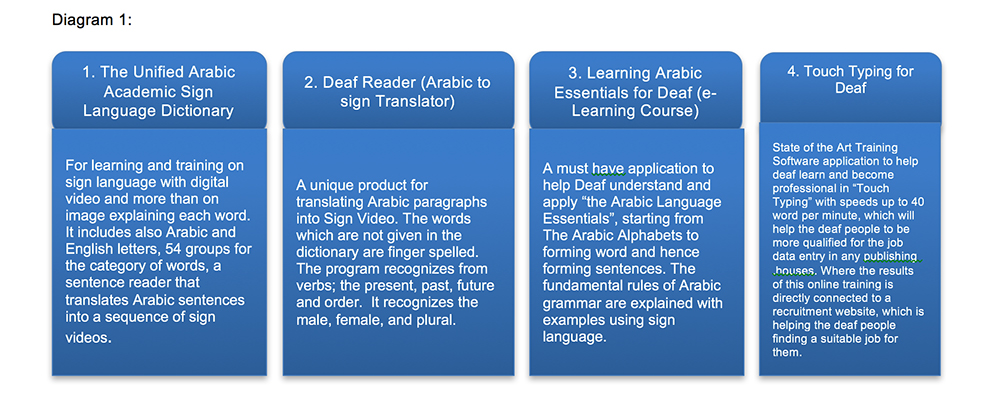
So far, the solution has achieved the followings:
- The Ministry of Education in Egypt approved the project and ordered the following as a start: The Cloud version of Tawasol system to be distributed for the 200 School in Egypt for Deaf (Al-Amal Schools) and The Unified Academic Sign Language Dictionary on DVD for the same schools
- In a collaborative agreement, both the MOE, MCIT and the Teachers academy have approved the Unified Academic Sign Language Dictionary as the main training program for training Teachers of the special needed students on sign language (5000 Teachers as a start).
- Khalifa Computer Group was granted a project from MCIT to extend the capability of “Tawasol” in accessibility for Deaf as a part of the second phase of the strategy suggested by KCG.
- Currently, KCG is negotiating with one of the largest newspaper agency in Egypt offering full year training through its training facility for sign language of Deaf and hearing people.
- KCG is also is negotiating one of the largest factories for food and drinks to train their staff on sign Language using “Tawasol”
- KCG has installed and tested the Tawasol system in two different Deaf Schools one in Cairo and the second was in Al-Fayoum City. The results were positive with great interest from both teachers and students.
Tawasol is available on the Internet with as yearly subscription-based accounts. The retail price for one account subscription per year is 1800 EGP, which includes all of the products.
Tawasol is an ongoing project. Through the first phase; Khalifa Computer Group has developed the above mentioned four major applications, which could be considered as the infrastructure of the strategic project. In the next phase, Tawasol builds applications on top of what was developed in the first phase as well as enhancing the functionality of the first phase applications. The three applications of the new phase can be seen in Diagram 2.
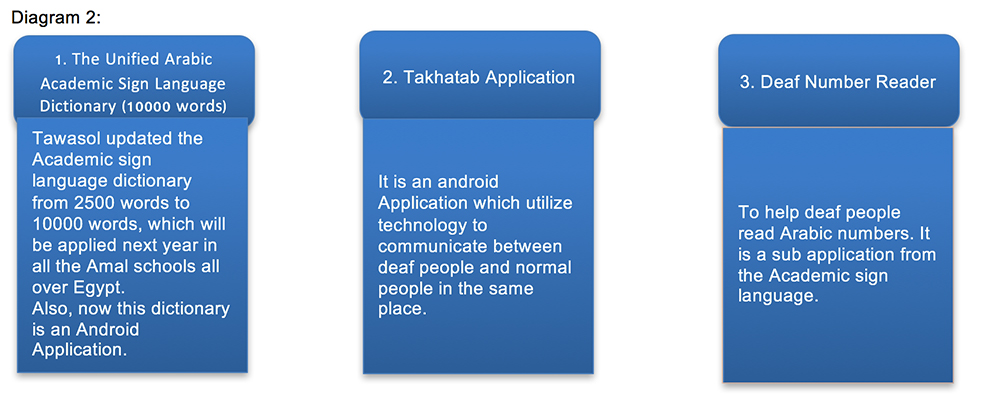
To achieve the ultimate goal of social inclusion of the hearing impaired persons in the society Khalifa Computer Group has been working on the next following steps:
- Developing software tools to help the deaf communicates with the listeners in the community.
- Provide professional sign language training for the listeners to facilities their interaction and communication with the deaf people through the using of the unified Arabic Academic sign language dictionary.
- Developing the Egyptian university education for the deaf.
Awards: Tamkeen Award by MCIT Egypt
Partners: Ministry of Education, Ministry of Communication and Information technology, Khalifa computer group, deaf NOG`s
Contact details:
Mailing Address: South-South Development Academy: 6th Ibn Maysser st., off Mahmoud Azmy st., Zamalek
Tel: (02) 2737 5086/7/8/9
Fax: (02) 27375084
Website: www.ssdaegypt.org
E-mail: This email address is being protected from spambots. You need JavaScript enabled to view it. – This email address is being protected from spambots. You need JavaScript enabled to view it.
YouTube: https://www.youtube.com/channel/UCw1l5nPlOlBE5B3zR5XzwWQ/featured
In 2014, according to CAPMAS, the Egyptian population has reached 87 million, growing 18% in eight years. The male to female ratio is almost equal, with some 45 million of each sex. With rising population levels, more jobs are needed each year. The official unemployment rate in Egypt reached an unprecedented high of 13.3% in the second quarter of 2014. Some of the major causes of unemployment in Egypt are overpopulation and the lack of proper education and sufficient training upon graduation.
Masr Ta3mal, meaning “Egypt Works”, is an initiative that focuses on developing the skills of Egyptian youth to increase their chances of employment. The focus of Masr Ta3mal initiative targets the largest youth segment which is aged between 15-29. The main aim of Masr Ta3mal initiative is to provide full employability eco-system and to empower the youth of Egypt and help them follow their goals in employment.
This is achieved firstly through the institutionalized career centers provided by the Egyptian Ministry of Youth and Sports in which the following activities take place: Career Advising, ICT Trainings, Business Development Trainings, Capacity Building, Job Placement, sessions on Entrepreneurship and Startups. The aim of these activities is to bridge the gap between the educational system and the job market needs in Egypt. These career centers are commonly known as ‘youth centers’ are owned by The Egyptian Ministry of Youth and Sports. There are youth centers which cover all the governorates in Egypt and it has access to a very large number of youths. This makes it suitable and easy to reach for youth from all around the country.
Masr Ta3mal has created a full cycle for youth development that works as follows:
- Career coaching online and offline sessions to define the youth personal skills and professional interest and to create career development plan.
- Online Diplomas and courses in IT, Languages, Business and soft skills.
- Job Matching tool to connect youth with employers.
- Entrepreneurial online and offline trainings to introduce the entrepreneurial thinking to Egyptian youth and to build the capacity of Egyptian young entrepreneurs.
- Civic Engagement activities to raise the awareness about extracurricular activities for students and the importance of volunteering for fresh graduates and young professionals through Masr Ta3mal mentorship program and Masr Ta3mal Youth Program.
- Masr Ta3mal Proto-type centers (Physical centries) provide:
- IT centers to provide IT trainings for youth to help them increase their efficiency and productivity.
- Business & career centers to provide career development and to align their education with demand in the labor market.
- Entrepreneurship centers to instill problem-solving skills, entrepreneurship, and management capacity and the value of self-employment.
Masr Ta3mal also has its own employability portal which is made accessible for the youth for further learning and services. The centers feed the portal with local content. It also creates a national youth network for employability the youth for further learning and services.
The key achievement of Masr Ta3mal so far as follows:
- 67 Masr Ta3mal Proto-type centers (physical centers) in 26 governorates
- 80 IT Centers in 27 governorates
- Reach 1,121,135 youth, got access to 133,621 and up skilled 30,976 youth
- 16,902 vacancies from December 2013 till 5th of February, 2015
- 323 Career Guides
- 850 Digital Literacy Trainers
- 230 Build Your Business Trainers
- 993 entrepreneurial beneficiaries.
- Masr Ta3mal Youth Group in 9 Universities with 350 members
- 120 potential social entrepreneurs
- 350 students trained on social entrepreneurship who will be able to raise the awareness of 15000 Student about Social entrepreneurship.
Partners: Ministry of Youth and Sports, UNDP, Silatech.
Contact details:
Mailing Address: South-South Development Academy: 6th Ibn Maysser st., off Mahmoud Azmy st., Zamalek
Tel: (02) 2737 5086/7/8/9
Fax: (02) 27375084
E-mail: This email address is being protected from spambots. You need JavaScript enabled to view it. – This email address is being protected from spambots. You need JavaScript enabled to view it.
YouTube: https://www.youtube.com/channel/UCw1l5nPlOlBE5B3zR5XzwWQ/featured
Website: http://www.ssdaegypt.org/
Until recently, there was a lack of high-quality, well-structured websites managed by companies creating digital content for Arabic-speaking users and of original, localized, high-quality content.
In order to support rural-urban integration into one knowledge society, and to empower communities through the provision of easy access to the information they need, in order to widen their horizons, and to increase their future and career opportunities. The Egyptian Ministry of Communication & Information Technology (MCIT) launched Kenanaonline jointly with the United Nation Development Program (UNDP) in 2007.
The objective is to increase useful Arabic E-content available on the internet, support citizens (in rural & urban areas) to use information technology to improve skills, career, income, health, agriculture, and knowledge, and helping communities move towards the Knowledge Society.

KenanaOnline work scope depends mainly on two major strategies:
- Networking and partnership: This is done through building a network of community partners from NGOs, experts, academia, universities, entrepreneurs and private sectors in every targeted field. In a parallel way, each partner actually participates in establishing a promising information society and implicitly encourages activities related to networking, business opportunities, and e-marketing.
- Community Mobilization: This is done through developing a series of public activities that are mainly directed towards raising awareness using Kenanaonline features and services. These series also targets mobilizing the Arabic-speaking people to actively participate in enlarging Kenanaonline knowledge networks, and enhancing the specialized free e-content.
Kenanaonline provides user-friendly online applications that allow users to build their online knowledge base to provide their communities with knowledge and consultancy in their respective fields of expertise. This service includes:
- Business directory system
- Websites and blogs creations services
- Internet marketing tools (Newsletter, classified Ads.)
- Customer Relation Management.
Since the launch, the solution contributed to establishing the knowledge society in MENA region by leading and moderating the generation and management of credible and specialized knowledge portals and developing the social mindset for using ICT in utilizing knowledge for sustainable community development and achieved the following:
- 1,390,000 pages published on the Internet
- 1,000 page added daily/ 30,000 per month
- 37,000 Daily visit
- 46,000 unique daily visitors.
The project can be replicated in other Arabic-speaking countries.
Partnerships: The Italian Cooperation, the Ministry of Agriculture, General Authority for Fish Resources Development, the Ministry of Social Solidarity, Egypt Arts Academy, the Egyptian Association for Persons with Special Need, Dreamers of Tomorrow Association.
Contact:
Mailing Address: South-South Development Academy: 6th Ibn Maysser st., off Mahmoud Azmy st., Zamalek
Tel: (02) 2737 5086/7/8/9
E-mail: This email address is being protected from spambots. You need JavaScript enabled to view it. – This email address is being protected from spambots. You need JavaScript enabled to view it.
Website: http://www.ssdaegypt.org
The Egyptian national initiative for human capacity building; “Education Development for Universities in Egypt (EDUEgypt)” is a training initiative implemented in 16 Egyptian universities spanning 57 faculties as a result of a cooperation protocol between the Ministry of Communications and Information Technology (MCIT) and the Ministry of Higher Education (MoHE) on the 30th of December in 2007. The program is implemented by the Egyptian Information Technology Institute (ITI); one of the leading Human Capacity Development and Building establishments regionally and internationally.
EDUEgypt aims at bridging the gap between the university students` skills and the required competencies by the ICT job market and targets senior students in Egyptian universities as an optional training program that is not part of students’ academic studies, promising them numerous job opportunities in the outsourcing industry on the successful completion of the Program.
EDUEgypt Program is carried out once a year in the 16 Egyptian universities.
The solution offers the following services: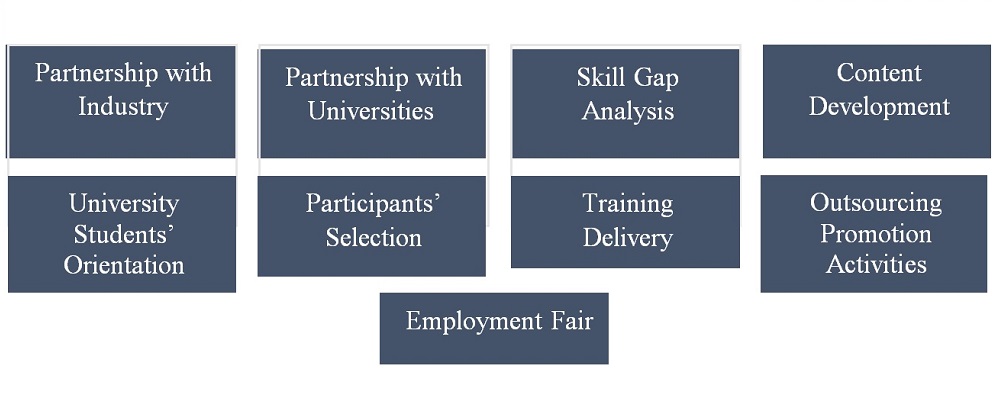
After seven years of implementation, the following accomplishments were achieved: Influencing the lives of 43,500 trainees through availing training opportunities across Egypt and qualifying them to have a job opportunity that would increase their income by providing up to 11,000 lucrative job opportunities (through 6 employment fairs) per year for graduates.
- The average employment rate of EDUEgypt graduates is 65%.
- Trainees` attendance exceeded 82% during the academic year.
- Cooperating with 16 Egyptian universities spanning 55 faculties to implement a training initiative.
- Through EDUEgypt’s orientation sessions, more than 100,000 university students, academia, and students’ parents are now aware of the outsourcing industry and its impact on the national economy.
- More than 100,000 Egyptian students were assessed as a part of EDUEgypt admission exam.
- Qualifying 500 Egyptian certified trainers (who delivered 10,875,000 training hours inside the Egyptian universities) and equipping them with latest training techniques and methodologies.
- EDUEgypt is a tool to brand Egypt as the potential destination for the O&O industry all overall the world.
Partners: The MCIT, ITIDA, ITI, Training Industry, MoHE, The Egyptian Universities, ICT Industry.
Details:
Mailing Address: South-South Development Academy: 6th Ibn Maysser st., off Mahmoud Azmy st., Zamalek
Tel: (02) 2737 5086/7/8/9
E-mail: This email address is being protected from spambots. You need JavaScript enabled to view it. – This email address is being protected from spambots. You need JavaScript enabled to view it.
The Mehwar Centre for the Protection and Empowerment of Women and Familiesu201d project was initiated in 2004 with the goal to provide support and safety to victims and survivors of violence through the first national specialized anti-violence centre in Palestine and it has been executed and technically supported by UN Women since 2008,withfunding by the Government of Italy until2012 and the Government of Iceland since 2013.
The Center has been established as a pilot in close cooperation with the Palestinian Government, local and international NGOs and the civil society in compliance with human-right based standards and policies for protection of women and children victims and survivors of violence. The project addresses the phenomenon of violence against women holistically by focusing on prevention of violence through community sensitization, as well as protection and social re-integration of victims and survivors of violence. It also advocates for the adoption of national laws, policies and mechanisms ensuring women`s victims the right to live in safety and dignity, while ending impunity for perpetrators of violence.
Since 2011 and benefitting from UN Women support in the institutionalization of Mehwar experience, the Mehwar Centre has been recognized by the Palestinian Ministry of Social Affairs, and the Palestinian Authority more broadly, as a national model for the development of standards of sheltering services for women across Palestine, besides serving as a base for the specialization of other sectors - including judicial and security sectors and legislative bodies - in addressing violence against women. Thanks to UN Women core funds, the Mehwar Centre has also established the first victim-based comprehensive data collection system on violence against women.
The Mehwar Centre is run by 22 highly trained professionals, it operates under the overall supervision of the Ministry of Social Affairs and provides a protected shelter for up to 35 women and their children together with social and legal counseling psychosocial support, health care, and legal representation in courts. Additionally the Mehwar Centre provides social and legal support services to families in distress, outreach and community sensitization programmes, including a nursery and a gym for children and women of the community. Mehwar team was awarded with the Human Rights Defender Price (2010) by the High Commissioner for Human Rights (OHCHR).
Since its opening, 304 women and 69 children victims and survivors of violence and under life threat were protected and empowered while sheltered and 267 sheltered women were reintegrated into the society through multi-stakeholder supported plans. 230 sheltered women and 109 women from outreach cases received legal counseling and about 1,430 family members benefited from Mehwar`s social and legal counseling. About 135 sheltered women benefited from vocational training opportunities with 56 training courses (nursing, medical secretariat, sewing and fashion design, hair dressing, jewelry design and handicraft, computer skills, English) and 49 women sheltered in Mehwar were provided job opportunities; 19 sheltered women who studied and worked outside the Centre benefited from a peer group support.
Owing to Mehwar the followings have been achieved:
1. A mechanism for the protection and reintegration of women, girls, and children victims of violence and under life-threat;
2. The recognition and promotion of Palestinian women and children human rights within the community;
3. Human rights-based standards and policies applied to anti-violence centers across Palestine
4. Government engagement in the fight against VAWG, validating and supporting provision of specialized anti-violence services, and translation of CEDAW principles into national strategies, policies and mechanisms;
5. Engagement of families of VAWG victims as women`s protection actors and empowerment advocates
UN Women/Mehwar Centre publications (in Arabic and English): 1) Evaluation of Policies and Procedures (2011); Good Practice for Recruiting Anti-violence Centre Personnel (2012); 3) Women Agents of Change (Mehwar experience 2008-2012); Final Project Evaluation (2012).
Partners: the Ministry of Social Affairs of Palestine, UN Women, the Government of Italy, the Government of Iceland.
Contact details:
The Mehwar Center
Bethlehem, State of Palestine
Tel. 00970-2-2748660
Acting Director, Saeda Al-Atrash
E-mail: This email address is being protected from spambots. You need JavaScript enabled to view it.
UN Women Palestine
Al Nouman St., Beit Hanina, Jerusalem
Tel. 00972-2-6280450
Fax. 00972-2-6280661
Special Representative, Alia El-Yassir
E-mail: This email address is being protected from spambots. You need JavaScript enabled to view it.








